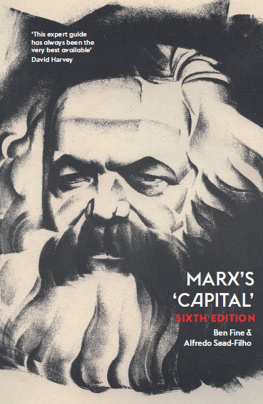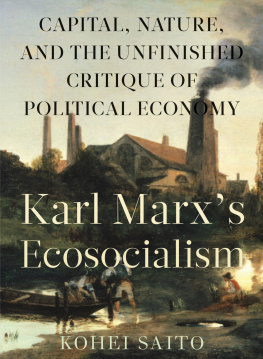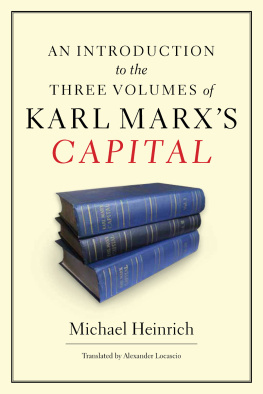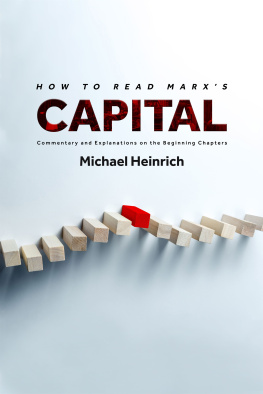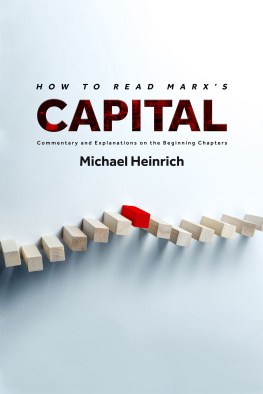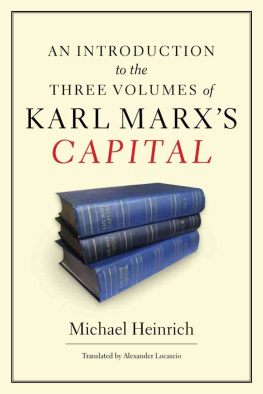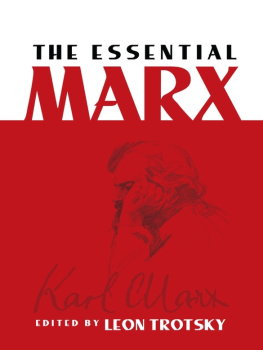Heinrich Michael - An Introduction to the Three Volumes of Karl Marxs Capital
Here you can read online Heinrich Michael - An Introduction to the Three Volumes of Karl Marxs Capital full text of the book (entire story) in english for free. Download pdf and epub, get meaning, cover and reviews about this ebook. year: 2004, publisher: Monthly Review Press, genre: Politics. Description of the work, (preface) as well as reviews are available. Best literature library LitArk.com created for fans of good reading and offers a wide selection of genres:
Romance novel
Science fiction
Adventure
Detective
Science
History
Home and family
Prose
Art
Politics
Computer
Non-fiction
Religion
Business
Children
Humor
Choose a favorite category and find really read worthwhile books. Enjoy immersion in the world of imagination, feel the emotions of the characters or learn something new for yourself, make an fascinating discovery.

- Book:An Introduction to the Three Volumes of Karl Marxs Capital
- Author:
- Publisher:Monthly Review Press
- Genre:
- Year:2004
- Rating:5 / 5
- Favourites:Add to favourites
- Your mark:
- 100
- 1
- 2
- 3
- 4
- 5
An Introduction to the Three Volumes of Karl Marxs Capital: summary, description and annotation
We offer to read an annotation, description, summary or preface (depends on what the author of the book "An Introduction to the Three Volumes of Karl Marxs Capital" wrote himself). If you haven't found the necessary information about the book — write in the comments, we will try to find it.
An Introduction to the Three Volumes of Karl Marxs Capital — read online for free the complete book (whole text) full work
Below is the text of the book, divided by pages. System saving the place of the last page read, allows you to conveniently read the book "An Introduction to the Three Volumes of Karl Marxs Capital" online for free, without having to search again every time where you left off. Put a bookmark, and you can go to the page where you finished reading at any time.
Font size:
Interval:
Bookmark:
Thank you for buying this ebook, published by NYU Press.
Sign up for our e-newsletters to receive information about forthcoming books, special discounts, and more!
Sign Up!
A publisher of original scholarship since its founding in 1916, New York University Press Produces more than 100 new books each year, with a backlist of 3,000 titles in print. Working across the humanities and social sciences, NYU Press has award-winning lists in sociology, law, cultural and American studies, religion, American history, anthropology, politics, criminology, media and communication, literary studies, and psychology.
An Introduction to the Three Volumes
of Karl Marxs Capital
byMICHAEL HEINRICH
Translated by Alexander Locascio

Copyright 2004 by Michael Heinrich
All Rights Reserved
Originally published as Kritik der politischen konomie: Eine Einfhrung by Schmetterling Verlag GmbH, Stuttgart, Germany 2004 by Schmetterling Verlag GmbH. English translation by Alexander Locascio published by Monthly Review Press 2012 by Monthly Review Press
Library of Congress Cataloging-in-Publication Data
Heinrich, Michael, 1957
[Kritik der politischen Vkonomie. English]
An introduction to the three volumes of Karl Marxs Capital / by Michael
Heinrich ; translated by Alexander Locascio.
p. cm.
Originally published as Kritik der politischen Vkonomie: Eine Einf|hrung by Schmetterling Verlag GmbH, Stuttgart, Germany, c2004, by Schmetterling Verlag GmbH.
Includes bibliographical references and index.
ISBN 978-1-58367-288-4 (pbk. : alk. paper) ISBN 978-1-58367-289-1
(cloth: alk. paper) 1. Marx, Karl, 18181883. Kapital. 2. Marxian
economics. I. Title.
HB501.M37H4513 2012
335.41dc23
2012019993
Monthly Review Press
146 West 29th Street, Suite 6W
New York, New York 10001
www.monthlyreview.org
5 4 3 2 1
Protest is occurring again. In 2011 the Arab Spring rocked the Arab world and overthrew a number of rulers, who seemed to be invincible, at least to their people. In summer people in several countries of Western Europe were inspired by the actions of the Arab Spring. They conquered public places to protest against the policies of the governments. And in fall 2011 Occupy Wall Street started in New York leading to Occupy-movements in many other countries. With the banking crisis of 2008 more people than ever during the last decades question capitalism: is it really the system which provides freedom and wealth for the majority as is promised by its supporters? Or is it the system which brings wealth only to the 1 percent and economic pressure and misery at different levels to the 99 percent? Even beyond traditionally left circles, discussions about the destructive consequences of capitalism are taking place.
That this is not a matter of course is proven by a quick glance into the past. At the beginning of the 1990s, after the collapse of the Soviet Union, it seemed as though capitalism had ultimately and globally triumphed as an economic and social model to which there was no alternative. Although there had always been many on the left who did not see a desirable alternative to capitalism in Soviet really existing socialism, such distinctions no longer seemed important. To most people, a society beyond the capitalist market economy appeared only as an entirely unrealistic utopia. Instead of protest, accommodation and resignation reigned.
But it was alsoand in particularthe 1990s which showed that capitalism, even after its apparent final victory, continued to go hand in hand with processes of crisis and immiseration; and Kosovo, Afghanistan, and the first war in Iraq showed that wars in which the developed capitalist countries were not only indirectly, but indeed very directly involved, were by no means a thing of the past. All this was taken up in different forms by the new counter-globalization movement and other social movements and made the point of departure for critique. Initially, these critiques were focused on single issues and posed limited demands that remained within the framework of the system. Furthermore, the critiques often rested upon a simple black-and-white moralism. However, throughout the course of these conflicts, fundamental questions kept being asked: about contemporary capitalisms mode of operation; about the connection between capitalism, the state, and war; and also about what kinds of changes are actually possible within capitalism.
Leftist theory became important again. Every transformative practice assumes a particular understanding of that which exists. If, for example, we demand the introduction of a Tobin Tax (that is, the taxation of currency transactions) as a crucial means for the taming of a capitalism unleashed,, then this implies a certain theorization of the importance of financial markets, about tamed or untamed capitalismwhether or not these assumptions are made explicit. How contemporary capitalism functions is not an abstract, academic question. The answer to this question has an immediate practical relevance for every anti-capitalist movement.
It is thus not surprising thatsince the end of the 1990s grand theoretical narratives have been en vogue again, such as Empire, by Antonio Negri and Michael Hardt, Manuel Castellss The Information Age, or recently published Debt The first 5.000 Years by David Graeber. Such books, although very different politically and in terms of content, employ Marxs categories to a greater or lesser extent: partly they are used to analyze contemporary developments; partly they are criticized as obsolete. It is obvious that today one cannot avoid Marxs Capital if one wants to fundamentally understand capitalism. However, common not only to these three books but also to a lot of other publications is their somewhat superficial treatment of Marxs categories: they often appear only as empty phrases. An engagement with the original is necessary, not only to criticize such superficiality, but above all because Capital, written more than a hundred years ago, gives a more comprehensive analysis of capitalism and is in many ways more contemporary than many of the pompously packaged works written in the present.
If we begin to read Capital, we encounter certain difficulties. Particularly at the beginning, the text is not always very easy to understand. The three books mere girth is also likely to act as a deterrent. Under no circumstances, however, should one be satisfied with reading only the first volume. Since Marx represents his object of inquiry on different levels of abstraction that mutually imply and complement each other, the theory of value and surplus value dealt with in the first volume can only be fully understood at the end of the third volume. What one believes to know after reading only the first volume is not only incomplete, but in fact distorted.
It is also somewhat tricky to understand the claim expressed in the subtitle of Capital and which Marx also used to characterize his entire scientific project: Critique of Political Economy. In the nineteenth century, political economy broadly referred to that which we today call economics. By using the term critique of political economy, Marx suggests that he is not interested only in a new presentation of political economy, but rather in a fundamental critique of all established economic science. Marx wants a scientific revolution, albeit with a political, social revolutionary interest in mind. In spite of all these difficulties, one should read
Next pageFont size:
Interval:
Bookmark:
Similar books «An Introduction to the Three Volumes of Karl Marxs Capital»
Look at similar books to An Introduction to the Three Volumes of Karl Marxs Capital. We have selected literature similar in name and meaning in the hope of providing readers with more options to find new, interesting, not yet read works.
Discussion, reviews of the book An Introduction to the Three Volumes of Karl Marxs Capital and just readers' own opinions. Leave your comments, write what you think about the work, its meaning or the main characters. Specify what exactly you liked and what you didn't like, and why you think so.

